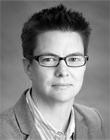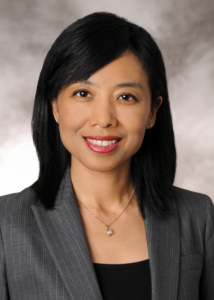 Welcome to Pride Week on The Glass Hammer — we’ll be profiling successful LGBT business women all week long!
Welcome to Pride Week on The Glass Hammer — we’ll be profiling successful LGBT business women all week long!
As a litigator, Emily Griffen is accustomed to speaking out in court or in legal meetings on behalf of her clients. But, like most people and especially women, speaking out about her career didn’t come quite as easily.
That is why Griffen, a litigation Counsel in global law firm Shearman & Sterling’s Bay Area offices, advises other women to have confidence in their skills and knowledge.
“Be vocal about your career interests and find people who will give you the opportunity to share your opinion,” she says. “This is how you will learn and grow.”
Career in Litigation
To date, that approach has taken her far, even though she didn’t really have a definitive career plan set in stone after college. According to Griffen, she was drawn to law school and especially litigation because of the complexity of the subject matter and the enjoyment she found in grappling with challenging legal concepts. She honed her strengths, identified her interests and aligned her passion for legal research, analysis and brief writing with her ultimate professional goal: to join a global law firm with a strong litigation group.
When Griffen started at Shearman & Sterling’s San Francisco office, she was involved in a number of securities class action and shareholder derivative cases, but as the scope of the litigation group has expanded, so have Griffen’s role and responsibilities. In recent years, her work has grown to include white collar crime and consumer class action suits, as well as securities and corporate governance litigation, for major clients like LG Electronics Inc. and Toyota Motor Corporation – and that variety is something Griffen is excited about. She works regularly with Shearman & Sterling’s litigation partners in the Bay Area – Patrick Robbins, Jeffrey Facter and Stephen Hibbard – as well as with the firm’s other litigation partners and senior lawyers around the world. Griffen also spent a one-year rotation in Shearman’s international arbitration group in the firm’s Paris office, and continues to work with that group from time to time as well.
In Griffen’s field, it is somewhat rare for a case to go to trial – most disputes are settled well before a jury is empaneled. Yet in only her fourth year as a lawyer, Griffen found herself immersed in a three-week-long jury trial in San Jose in a securities-related employment dispute. “This was an incredible and unique experience for me so early in my career,” said Griffen, who argued complicated pre-trial motions in front of the judge and questioned witnesses at trial. “We won the case, obtaining a complete defense verdict, and I feel so fortunate to have had such a rewarding experience, which is rare for a securities litigator.”
More recently, Griffen found herself on the eve of trial again when she was part of the defense team representing the former CFO of a Silicon Valley software company in a civil enforcement action by the Securities and Exchange Commission. “We obtained a favorable settlement for our client at the last minute after years of litigation, but we had to prepare our case as if we were going to trial. It was a very exciting case to be involved in,” said Griffen. As part of the settlement avoiding trial, the SEC agreed to drop all of its fraud claims against Griffen’s client.









